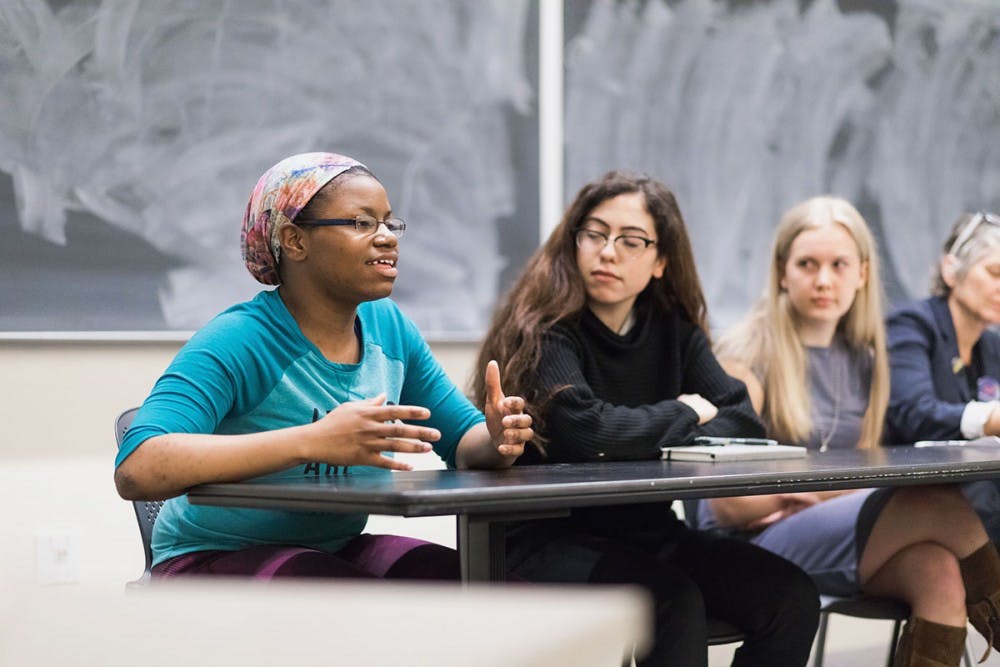Asst. Music Prof. Nomi Dave moderated a panel of University students and members of the Charlottesville community concerning gun violence Monday. The panel was entitled “Gun Sense” and focused on topics including gun violence as it relates to school shootings as well as race and domestic violence.
Alongside Student Council President Sarah Kenny, Dave was an active member in organizing the University National School Walkout March 14 against gun violence and in solidarity with the victims of the Feb. 14 shooting at Marjory Stoneman Douglas High School in Parkland, Fla. About 1,000 students, faculty and community members gathered on the Lawn March 14 alongside high schools and universities across the nation for 17 minutes to honor the 17 victims who died in the Parkland shooting.
Monday’s panel was not directly a reaction to Parkland, as the Walkout was. Dave said she has been planning this panel since the fall.
“[For a while now] We’ve been trying to … give students a vocabulary to talk about gun violence, as well as encourage existing groups to act publicly,” Dave said.
The panel included Kathryn Laughon, an associate nursing professor, and Sally Hudson, an assistant professor of public policy, education and economics.
The panel also included a local Charlottesville high school student, Fré Halvorson-Taylor, senior at Charlottesville High School, as well as two University students — Keiara Price, a second-year College student and Black Student Alliance member, and Raiya Al-Nsour, a second-year College student and Minority Rights Coalition member.
In an interview with The Cavalier Daily, Dave said she had specific hopes for the event.
“[We need to] get together in a place to talk about gun violence outside of the case of school shootings and the proliferation of guns in our community … and to address the intersectionality of gun violence and how it is affected by questions of race and domestic violence,” Dave said.
Dave began the event by showing clips from “Under the Gun,” a 2016 documentary directed by Stephanie Soechtig on the contemporary issue of gun violence in American politics.
The clips were meant to give “a brief history of American gun legislation and it’s interactions with public forums such as television, radio and newspapers,” Dave said.
Afterwards, the panelists each gave a short talk on their own experience or expertise. Price tackled the intersectionality of issues of gun violence and control in her own experience as a young black woman.
“I was being raised simply to survive, not to be a child,” Price said.
Price also said she is concerned with the ways in which black communities have been treated by the conversation around gun violence so far.
“It’s always low income cities that are predominately black/brown cities … it’s a society problem, but it’s treated as a problem in that community when that community is put into that situation,” Price said. “People are being told ‘you’ve got to know how to survive’ and violence is the only way these people know how to exit these situations.”
Al-Nsour also spoke from personal experience as a young Arab woman, specifically on her reaction to the school shooting at Marjory Stoneman Douglas High School.
“[My first reaction was] is the person an arab/muslim person?” Al-Nsour said. “That has a personal impact on me … Hearing that it was a white terrorist didn’t make me feel any better … the media ran with the story that the shooter had a mental illness.”
Al-Nsour also made a point of acknowledging the way the public reacts to shootings in different communities, as well as acknowledging how Parkland students have had an influence on that reaction.
“It has touched a white, affluent Florida neighborhood … they acknowledge their privilege as white, affluent students and ask, ‘Where were these donations during the height of Black Lives Matter?’” Al-Nsour said.
Laughon used her expertise to introduce facts to the conversation.
“Eighty-two percent of firearm homicides in the world occur in the U.S., 90 deaths and 120 injuries caused every day,” Laughon said. “A gun injury is often a lifelong and life altering injury.”
Laughon also stressed the importance of underlying issues when talking about less-publicized shootings, like those in domestic situations.
“Half of shooters are motivated by domestic violence,” Laughon said.
In an interview with The Cavalier Daily, Laughon elaborated on why she chose to participate in this conversation on gun violence.
“[Dave] and I had met through other activist things,” Laughon said. “[People believe] we can’t change this, and then all of a sudden we are.”
Hudson spoke directly to the young people in the audience, emphasizing the significance of the upcoming congressional election in November.
“You can’t skip this election in November 2018 if you’re serious about gun reform … only about one in five people in their twenties will show up to vote for a congressional election,” Hudson said.
Hudson also explained her own experience as an economist as well as a lobbyist at the Virginia General Assembly.
“I do electoral reform work … and by virtue of the work I do in economics, its very state-regulated, so you have to learn the rules of the road,” Hudson said.
Following the panelists’ discussion, the floor was opened up for the audience to ask questions.
First-year College student Katherine Long asked the panel whether or not gun control would make black communities vulnerable.
“American media has a tradition of ignoring the voices of these communities,” Long said. “How would you respond to the question of gun control in the black communities? Does that make them more vulnerable?”
The panelists all agreed that gun control would make communities safer.
“There is very little use for owning firearms for self-protection” Laughon said.
Price echoed this sentiment, commenting on the violence caused by the presence of guns in society.
“As long as guns are there, there is a space for violence” Price said.







